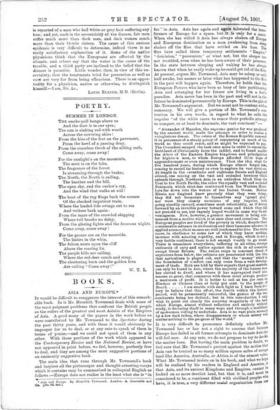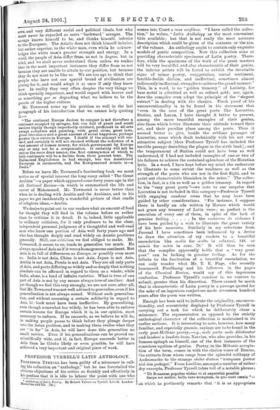BOOKS.
ASIA AND EUROPE.*
IT would be difficult to exaggerate the interest of this remark- able book. In it Mr. Meredith Townsend deals with some of the moot poignant problems that confront the British people as the rulers of the greatest and most Asiatic of the Empires of Asia. A good many of the papers in the work before us were contributed by Mr. Townsend to the Spectator during the past thirty years, and with these it would obviously be improper for us to deal, or at any rate to speak of them in terms of praise,—and we could not speak of them in any other. With those portions of the work which appeared in the Contemporary Review and the National Review, or have not 'appeared in print before, we feel, however, perfectly free
• to deal, and they are among the most suggestive portions of an eminently suggestive book.
The main idea that runs through Mr. Townsend's book and iiispiret all the picturesque and thought-arresting essays which it contains may be summarised in colloquial English as follows :—Europe does not realise in the least what she is " in
• Asia and Europe. By Meredith Townsend. London: A. Constable and Co. [Ms ed. net.1 for" in Asia. Asia has again and again tolerated the inter. ference of Europe for a space, but ,it ,is only for a space When she has willed it Asia has always shaken off Ellrope. and European domination as a .man awakening from sleep shakes of the flies that have settled on his face. The flies have called these . temporary settlements !` Empire:, " dominion," " possession," or what not, but the sleeper ha3 not troubled, even when he has been aware of their presence. In the state between sleeping and waking he has always known that when he really woke up he could get rid of the At present, argues Mr. Townsend, Asia may be asleep or only half awake, but sooner or later what has happened to the flies in the past will happen again. Therefore, he holds .that the European Powers who have been so busy of late partitioning Asia and arranging for her future are living in a fool's paradise. Asia never has been in the past and will not in the future be dominated permanently by Europe. This is the gist of Mr. Townsend's argument. But we must not be content with a summary. We will give a portion of Mr. Townsend's con. tention in his own words, in regard to what he calls the impulse "of the white races to renew their periodic attempt to conquer, or at least to dominate, the vast continent" :— " Alexander of Macedon, the supreme genius for war produced by the ancient world, made the attempt in order to realise a vainglorious dream. The rulers of the Roman Republic renewed it in pursuance of &steady policy of conquering as much of the world as they could reach, and as might be expected to pay. The Crusaders essayed the task once more in order to rescue the birthland of Christianity from the infidel, and to found amidst the debris of the Eastern Empire kingdoms and principalities for highbo,n men, to whom Europe afforded little hope of aggrandizement or even maintenance. Then the idea slept for five hundred years, during which Europe almost forgot Asia, ceasing to record its history or even to explore its vast divisions. At length in the seventeens and eighteens Russia and England stirred, one seizing :on the vast and secluded territory which extends through Northern Asia in an unbroken block from the Ural to the North Pacific, the other the equally vast and secluded Peninsula which Stretches southward from 'the Western Huns- laya far down into the waters of the Indian Ocean. Neither Russia nor England knew precisely what they were doing; they did not formulate to themselves any 'grand plan: nor were they clearly conscious of any impulse, both going steadily onward, sometimes most reluctantly, its- if driven forward by an invisible power toward some end which they did not pretend to see, but vaguely hoped would in some way be ad. vantageous. Now, however, a greater movement is being corn- menced from a motive which is at once clear and conscious. The European peoples are tired of the poverty in which, despite their considerable advance in civilisation and their immense advance in applied science, their masses are still condemned to live. The white races, in obedience to some law of which they know nothing, increase with amazing rapidity, and in' Europe, which is not very fertile continent, there is not enough wealth to go round. There is uneasiness everywhere, suffering in all cities, strange outbursts of envy and malice against the rich in all countries except Great Britain. The rulers reign in constant dread of explosions from below, the subjects; are penetrated with the idea that agriculture is played out, and that the ` money' which is the foundation of c.imfort can only come from a vast develop- ment of trade. Both are told by their experts that great markets can only be found in Asia, where the majority of the human race has elected to dwell, and where it has aggregated itself into masses so great, that commerce with them must always produce a maximum of profit. It is better to sell at ten per cent. to Hindoos or Chinese than at forty per cent. to the people of Brazil am unable with such light as I have from his
to believe that this effort, the fourth within the historic period, will be permanently successful, the genius of the two -continents being too distinct; but in this introduction I only wish to point out clearly the amazing magnitude of the task which Europe, almost without reflection and entirely without study, is declaring itself in many ways and through a multitude of spokesmen willing to undertake. Asia is no vast plain misused by a few dark tribes, whose disappearance or whose misery will matter nothing to the progress of the world."
It is very difficult to pronounce definitely whether Mr. Townsend has or has not a right to assume. that because Europe has failed in all former attempts to dominate Asia she will fail now. At any rate, we do not propose to try to deci&e the matter here. But leaving the main problem in doubt, we feel sure that Mr. Towneend's protest against the notion that Asia can be treated as so many million square miles of savage land like America, Australia, or Africa is of the utmost value. What Mr. Townsend insists on in his book, and what we hope will be realised by his readers in England and America, i3 that Asia, and its ancient Kingdoms and Empires, cannot be looked on as mere derelict land, but that -it is, and must be considered to be, a continent filled with civilised peoples who have, it is true, a very different social organisation from our
own, and very different social and political ideals, but who must never be regarded as .mere " backward " savages. The savage knows himself to be, and thinks himself, inferior to the European.. The Asiatic does not think himself inferior, but rather superior, to the white man, even while he acknow- ledges the white man's greater strength and energy.. In a word, the people of Asia differ from us not in degree, but in kind, and we shall never understand them unless we realise that in the most important instances they differ from us not because they are unable to attain to our position, but because they do not want to be like us. We are too apt to think that people- who have not our special brand of civilisation are pining for it, and would adopt it at once if only they knew how. In reality they very often despise the very things we
think specially important, and would regard with horror and as something per se degrading what we believe to be the
proofs of the higher culture. Mr. Townsend sums up his position so well in the last paragraph of his introduction that we cannot help quoting it:—
"The continent Europe desires to conquer is not therefore a continent occupied by savages, but one full of great and small nations highly though imperfectly civilised, proficient in all arts except sculpture and painting, with great cities, great laws, great literatures and a great amount of social happiness, perhaps greater than exists in Europe. I doubt if the attempt will suc- ceed, and certainly it will not succeed without the infliction of a vast amount of human misery, for which government by Europe may or may not be a compensation. It certainly will not be unless the races draw nearer, the first consequence of which to both continents will be a decline from their present tone. The Italianized Englishman is bad enough, but the Asiaticized European is intolerable, and the Europeanized Asiatic is—a Pasha."
.Before we leave Mr. Townsend's fascinating book we must notice as of special interest the long essay called " The Great
Arabian "—a paper which appeared some forty years ago in the
old National Review—in which is summarised the life and career of Mahommed. Mr. Townsend is never better than
when he is dealing with Arabia and the Arabians, and in his paper we get incidentally a wonderful picture of that cradle of religious ideas,—Arabia.
We desire to point out to our readers what an amount of food for thought they will find in the volume before us rather than to criticise it in detail. It is, indeed, little applicable
to ordinary criticism, for it only professes to be the clear, independent personal judgment of a thoughtful and well-read man who knew one portion of Asia well forty years ago and
who has thought deeply and read widely on Asiatic problems generally. Still, one criticism we feel obliged to make. Mr. Townsend, it seems to us, tends to generalise too much. He always speaks of Asia as if it were ahomogeneous continent. But Asia is as full of differences as Europe, or possibly even more so. India is not Asia, China is not Asia, Japan is not Asia, Arabia is not Asia, Persia is not Asia. They are all only parts of Asia, and parts differing so widely and so deeply that nothing absolute can be affirmed in regard to them as a whole; while India, alone, is a land of infinite varieties. What is true of one part of Asia is not by any means always true of another. And yet though we feel this very strongly, we are not sure, after all, that Mr. Townsend was not well advised to generalise, even if his generalisation is not always sound. Without such generalisa- tion, and without assuming a certain solidarity in regard to Asia, hi:, book must have been ineffective. By generalising, even though somewhat too widely, he has been able to enforce certain lessons for Europe which it is, in our opinion, most necessary to enforce. If he succeeds, as we believe he will do, in making people pause to think before they plunge deeper into the Asian problem, and in making them realise what they are " in for " in Asia, he will have done this generation no small service. Even if his generalisations can be proved un- scientifically wide, and if, in fact, Europe succeeds better in Asia than he thinks likely or even possible, he will have achieved a very important and original piece of work.



































 Previous page
Previous page